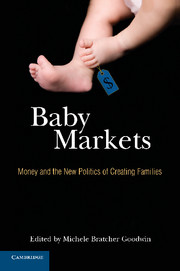Book contents
- Frontmatter
- Contents
- Preface
- Acknowledgments
- Introduction
- PART ONE WHAT MAKES A MARKET? EFFICIENCY, ACCOUNTABILITY, AND RELIABILITY OR GETTING THE BABIES WE WANT
- PART TWO SPACE AND PLACE: REPRODUCING AND REFRAMING SOCIAL NORMS OF RACE, CLASS, GENDER, AND OTHERNESS
- 6 Adoption Laws and Practices: Serving Whose Interests?
- 7 International Adoption: The Human Rights Issues
- 8 Heterosexuality as a Prenatal Social Problem: Why Parents and Courts Have a Taste for Heterosexuality
- 9 Transracial Adoption of Black Children: An Economic Analysis
- PART THREE SPECTRUMS AND DISCOURSES: RIGHTS, REGULATIONS, AND CHOICE
- PART FOUR THE ETHICS OF BABY AND EMBRYO MARKETS
- PART FIVE TENUOUS GROUNDS AND BABY TABOOS
- Author Bios
- Index
- References
7 - International Adoption: The Human Rights Issues
Published online by Cambridge University Press: 05 August 2012
- Frontmatter
- Contents
- Preface
- Acknowledgments
- Introduction
- PART ONE WHAT MAKES A MARKET? EFFICIENCY, ACCOUNTABILITY, AND RELIABILITY OR GETTING THE BABIES WE WANT
- PART TWO SPACE AND PLACE: REPRODUCING AND REFRAMING SOCIAL NORMS OF RACE, CLASS, GENDER, AND OTHERNESS
- 6 Adoption Laws and Practices: Serving Whose Interests?
- 7 International Adoption: The Human Rights Issues
- 8 Heterosexuality as a Prenatal Social Problem: Why Parents and Courts Have a Taste for Heterosexuality
- 9 Transracial Adoption of Black Children: An Economic Analysis
- PART THREE SPECTRUMS AND DISCOURSES: RIGHTS, REGULATIONS, AND CHOICE
- PART FOUR THE ETHICS OF BABY AND EMBRYO MARKETS
- PART FIVE TENUOUS GROUNDS AND BABY TABOOS
- Author Bios
- Index
- References
Summary
Human rights issues are at the core of the current debate over international adoption. Many of us who support international adoption see it as serving the most fundamental human rights of the most helpless of humans – the rights of children to the kind of family love and care that will enable them to grow up with a decent chance of living a healthy and fulfilling life. Many who oppose international adoption, however, argue that it violates the human rights of the children placed and of any birth parents that may exist, and serves only the interests of those who should be seen as having no rights – the adults who want to become parents.
Human rights activists in the international adoption arena have spoken with a relatively singular voice – a voice that is generally critical of international adoption, calling either for its abolition, or for restrictions that curtail its incidence in ways that I see as harmful to children, limiting their chances of being placed in nurturing homes with true families, and condemning even those who are placed eventually for unnecessary months and years in damaging institutions. This voice has had a powerful impact, in part because the international children's rights organizations taking the negative view include such powerful ones as the United Nations Children's Fund (UNICEF) and the United Nations Committee on the Rights of the Child (CRC).
- Type
- Chapter
- Information
- Baby MarketsMoney and the New Politics of Creating Families, pp. 94 - 117Publisher: Cambridge University PressPrint publication year: 2010
References
- 3
- Cited by



